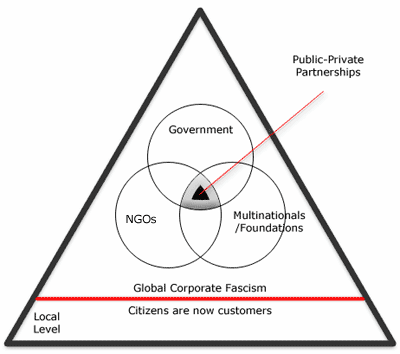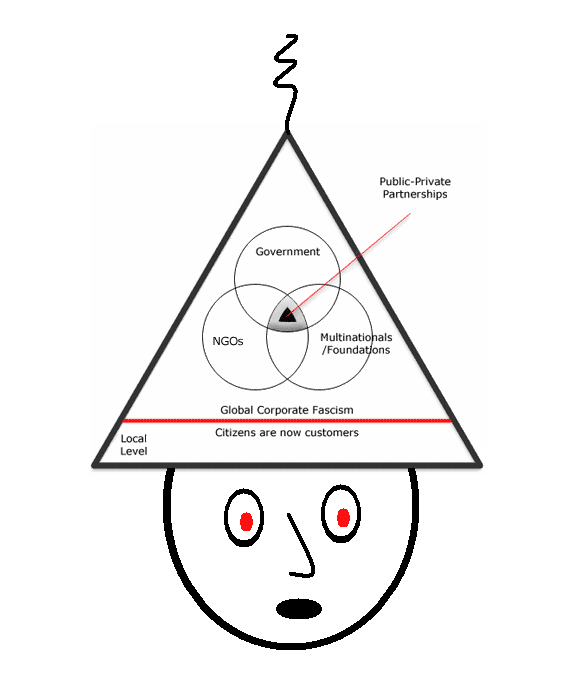
Posted on 09/13/2009 11:38:19 AM PDT by BGHater
Sunday’s Washington Post reports that “J.P. Morgan Chase for the first time convened its board in Washington this summer, calling the directors to a meeting at the downtown Hay-Adams hotel, then dispatching them to Capitol Hill for meet-and-greets,” highlighting the bed-sharing between State and economy in an article titled, “In Shift, Wall Street Goes to Washington: District Rises as New Financial Center”.

“Fascism should more properly be called corporatism because it is the merger of state and corporate power.” –Benito Mussolini
David Cho, Steven Mufson and Tomoeh Murakami Tse report:
As financial firms navigate a life more closely connected to government aid and oversight than ever before, they increasingly turn to Washington, closing a chasm that was previously far greater than the 228 miles separating the nation’s political and financial capitals.
In the year since the investment bank Lehman Brothers collapsed, paralyzing global markets and triggering one of the biggest government forays into the economy in U.S. history, Wall Street has looked south to forge new business strategies, hew to new federal policies and find new talent.
“In the old days, Washington was refereeing from the sideline,” said Mohamed A. el-Erian, chief executive officer of Pimco. “In the new world we’re going toward, not only is Washington refereeing from the field, but it is also in some respects a player as well. . . . And that changes the dynamics significantly.”
Washington has become a dominant player. Over the past year, the Federal Reserve and the Treasury have injected trillions of dollars into frozen financial markets, snapping up unwanted bonds, extending guarantees to banks and slashing interest rates.
Three times as much U.S. taxpayer money has gone into propping up a single firm, insurance giant American International Group, as the world spent a decade ago during the financial rescue of South Korea, then the world’s 11th-largest economy. And the emergency bailout of financial firms that Congress approved last year has cost nearly as much as the first five years of the war in Iraq.
Now the Treasury and the Federal Reserve are embroiled in everything from credit cards and home loans to auto manufacturing, from overseeing executive pay to shaping boards of directors.
In response, senior executives of major financial companies are traversing the Beltway to meet lawmakers in person for the first time. Firms such as Fidelity Investments, BNY Mellon and even Goldman Sachs, which has prospered in the crisis relative to many other banks, are opening additional offices or bulking up their staffs in the capital.
For decades, the federal government has played a key role in financial markets through regulation, public spending and monetary policy. But the government has now established itself as never before as the most dynamic actor in the still ailing economy. That prominence is sure to fade as the rescue programs wind down. Yet Wall Street executives say the legacy could be enduring.
The relationship “has changed in the sense that it’s clear that every one of the firms, including Goldman Sachs, recognizes that they would not exist today had the government not stepped in when it did,” one former senior bank executive said.
Aiming to avoid a repeat of the crisis, Obama administration officials, meanwhile, remain determined to overhaul the regulation of financial firms and markets. These measures, if enacted, would affect the essence of these businesses, altering what kind of activities they could pursue, how they would be shut down if they ran into trouble, and how much capital they must maintain, which directly influences profitability and their ability to lend.
“This crisis has and will fundamentally change the relationship between Wall Street and Washington for decades to come,” said Richard H. Clarida, an assistant Treasury secretary under President George W. Bush who is now an economics professor at Columbia University. “It’s often said that Wall Street is no longer the financial capital, that it’s Washington, D.C., and that’s certainly true. I don’t think this is destined to change. I think this is going to be a fact of life.”…
The revolving door between government and business is not new, and connections inside Washington have long been a calling card in the private sector. But some executives say the qualification Wall Street now covets is a fine-grain understanding of how regulators are managing the mortgage market and planning for its transformation….
As much as financial firms have watched Washington, the federal government has been using its new leverage to demand intelligence from Wall Street about prospective deals, major hirings and executive compensation.
Never before have public officials been in a position to extract these private details, and that change alone testifies to the new terms of this relationship.
As a leading financial lobbyist put it: “The industry is bending over backward to give policymakers at Treasury and elsewhere a heads-up on…any big thing that’s going on.”
“Back on Wall Street, the wise guys are up to their old tricks, suckering investors into a stock and commodity rally, posting huge profits on their trading desks and passing out Ferrari-sized bonuses,” Steven Pearlstein, business columnist at The Washington Post, wrote Friday. “The Wall Street Journal reports they’ve even cranked up the old structured-finance machine, buying up claims to life insurance proceeds and packaging them into securities.”
Mr. Pearlstein cites a panel convened by the Aspen Institute that included “billionaire investors Lester Crown and Warren Buffett; mutual fund pioneer John Bogle; Richard Trumka, the soon-to-be new president of the AFL-CIO; present and former corporate chief executives Jim Rogers of Duke Energy, Lou Gerstner of IBM and Henry Schacht of Cummins; retired Wall Street hands John Whitehead of Goldman Sachs, Pete Peterson of the Blackstone Group and Felix Rohatyn of Lazard Freres; Marty Lipton, Ira Millstein and John Olson, the deans of the corporate bar; and respected academics such as Bill George of Harvard and Lynn Stout of UCLA”
The panel compiled a report which complains–in Mr. Pearlstein’s words–that “the focus on short-term financial performance by investors, money managers and corporate executives has systematically robbed the economy of the patient capital it needs to produce sustained and vigorous economic growth”, adding: “During the late ’80s, the late ’90s, and again during the recent boom, investors earned record returns and corporate executives and money managers earned record pay packages. But after the bubble burst in each cycle, the gains to investors turned out largely to have been a mirage, while the gains of the executives and the money managers remained largely intact.”
92 banks have fallen in 2009, as a select few on Wall Street continue to bring in “outsized profits“. Depends on who you know, I guess.
People around here “fear” a government takeover of Wall Street. I just wish that they were equally afraid of a Wall Street take-over of government. Wall street is not a bastion of capitalism. It is a den of pirates and thieves much like D.C.
We the people are the townsfolks in which they wish to plunder.
There isn't anything 'corporate' about facism. It is government control over private entity. The private concerns do all the hard work, put up the capital, and then government steps in and takes control - not through purchase of stock or value, but by illegal rule. Does this sound familiar GM stockholders? (ha! if there are any sane people still out there holding that stock)......
“J.P. Morgan Chase for the first time convened its board in Washington this summer...highlighting the bed-sharing between State and economy”
Wasn’t that relationship pretty well estasblished about 100 years ago when Morgan boys helped write the Federal Reserve Act, the basis for radical federal interference in the banking/finance industry (end hence the entire economy)?
If only the pic could show David Axelrod feeding the words onto the teleprompter for Obortion to read.

Disclaimer: Opinions posted on Free Republic are those of the individual posters and do not necessarily represent the opinion of Free Republic or its management. All materials posted herein are protected by copyright law and the exemption for fair use of copyrighted works.